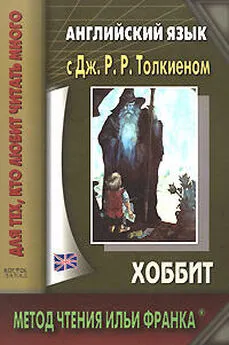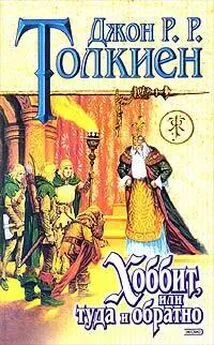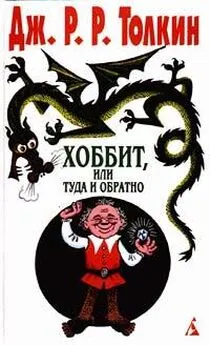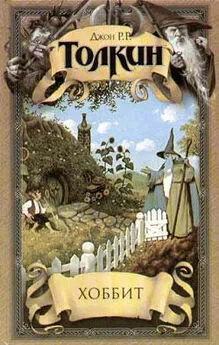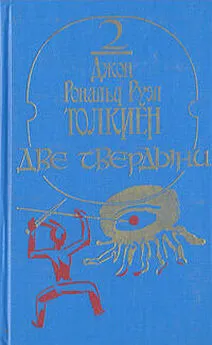Джон Толкиен - Английский язык с Дж. Р. Р. Толкиеном. Хоббит
- Название:Английский язык с Дж. Р. Р. Толкиеном. Хоббит
- Автор:
- Жанр:
- Издательство:АСТ, Восток-Запад
- Год:2008
- Город:Москва
- ISBN:978-5-17-048593-2, 978-5-478-00597-9
- Рейтинг:
- Избранное:Добавить в избранное
-
Отзывы:
-
Ваша оценка:
Джон Толкиен - Английский язык с Дж. Р. Р. Толкиеном. Хоббит краткое содержание
В книге предлагается произведение на английском языке Джона Р. Р. Толкиена «Хоббит», адаптированное (без упрощения текста оригинала) по методу Ильи Франка. Уникальность метода заключается в том, что запоминание слов и выражений происходит за счет их повторяемости, без заучивания и необходимости использовать словарь.
Пособие способствует эффективному освоению языка, может служить дополнением к учебной программе.
Предназначено для студентов, для изучающих английский язык самостоятельно, а также для всех интересующихся английской культурой.
Пособие подготовила Ольга Ламонова.
Английский язык с Дж. Р. Р. Толкиеном. Хоббит - читать онлайн бесплатно полную версию (весь текст целиком)
Интервал:
Закладка:
Then they wanted to know all about his adventures (затем они захотели узнать все о его приключениях) after they had lost him (после того, как они потеряли его), and he sat down and told them everything (и он присел и рассказал им все) — except about the finding of the ring (за исключением находки кольца) (“not just now (не сейчас) ” he thought (подумал он)). They were particularly interested in the riddle-competition (они особенно заинтересовались /его/ соревнованиями в загадках), and shuddered most appreciatively (и содрогнулись, боле чем понимающе) at his description of Gollum (при его описании Голлума).
“And then I couldn’t think (и тогда я не мог придумать) of any other question (ни одного вопроса) with him sitting beside me (когда он сидел рядом со мной), ” ended Bilbo (закончил Бильбо); “so I said (и тогда я сказал) ‘what’s in my pocket (что в моем кармане)?’ And he couldn’t guess in three goes (и он не смог угадать за три захода). So I said (тогда я сказал): ‘what about your promise (как насчет твоего обещания)? Show me the way out (покажи мне путь отсюда)!’ But he came at me to kill me (но он подошел ко мне, чтобы убить меня), and I ran (и я побежал), and fell over (и упал), and he missed me in the dark (и он не заметил меня в темноте; to miss — зд. промахнуться, пропустить ). Then I followed him (затем я последовал за ним), because I heard him talking to himself (потому что я слышал, как он разговаривал сам с собой). He thought I really knew the way out (он думал, что я на самом деле знаю выход), and so he was making for it (и поэтому он двинулся к нему). And then he sat down in the entrance (и тогда он присел у входа), and I could not get by (и я не мог пройти мимо /него/). So I jumped over him (и тогда я прыгнул на него) and escaped (и ускользнул), and ran down to the gate (и побежал вниз, к воротам). ”
“What about guards (а как же стражники)?” they asked (спросили они). “Weren’t there any (разве там их не было)?”
“O yes! lots of them (о да, кучи /их/); but I dodged ‘em (но я увернулся от них). I got stuck in the door (я застрял в двери), which was only open a crack (которая была только приоткрыта; crack — трещина ), and I lost lots of buttons (и я потерял кучи пуговиц), ” he said sadly looking at his torn clothes (сказал он печально смотря на свою разорванную одежду). “But I squeezed through all right (но я протиснулся) — and here I am (и вот я здесь). ”
appreciative [ǝˈpri: ʃǝtɪv] entrance [ˈentrǝns] squeeze [skwi: z]
Then they wanted to know all about his adventures after they had lost him, and he sat down and told them everything — except about the finding of the ring (“not just now” he thought). They were particularly interested in the riddle-competition, and shuddered most appreciatively at his description of Gollum.
“And then I couldn’t think of any other question with him sitting beside me, ” ended Bilbo; “so I said ‘what’s in my pocket?’ And he couldn’t guess in three goes. So I said: ‘what about your promise? Show me the way out!’ But he came at me to kill me, and I ran, and fell over, and he missed me in the dark. Then I followed him, because I heard him talking to himself. He thought I really knew the way out, and so he was making for it. And then he sat down in the entrance, and I could not get by. So I jumped over him and escaped, and ran down to the gate. ”
“What about guards?” they asked. “Weren’t there any?”
“O yes! lots of them; but I dodged ‘em. I got stuck in the door, which was only open a crack, and I lost lots of buttons, ” he said sadly looking at his torn clothes. “But I squeezed through all right — and here I am. ”
The dwarves looked at him (гномы смотрели на него) with quite a new respect (с совершенно новым уважением), when he talked about dodging guards (когда он говорил о том, как увернулся от стражников), jumping over Gollum (перепрыгнул через Голлума), and squeezing through (и протиснулся сквозь /дверь/), as if it was not very difficult or very alarming (как если бы это не было слишком трудным или тревожащим).
“What did I tell you (что же я вам говорил)?” said Gandalf laughing (сказал Гэндальф, смеясь). “Mr. Baggins has more about him (у мистера Бэггинса с собой: «вокруг него» есть больше = имеет больше способностей) than you guess (чем вы можете предположить). ” He gave Bilbo a queer look (он странно поглядел на Бильбо) from under his bushy eyebrows (из под своих кустистых бровей; bush — куст ), as he said this (когда он говорил это), and the hobbit wondered (и хоббит задумался) if he guessed at the part of his tale (догадался ли тот о той части его истории) that he had left out (которую он не упомянул; to leave (left) out — пропускать, не включать ).
Then he had questions of his own to ask (затем у него появились собственные вопросы, которые он хотел задать), for if Gandalf had explained it all by now to the dwarves (так как если Гэндальф и объяснил их все к этому моменту гномам), Bilbo had not heard it (то Бильбо не слышал этого). He wanted to know (он хотел знать) how the wizard had turned up again (как это волшебник появился снова; toturnup—подниматьвверх, загибать; внезапно появляться ), and where they had all got to now (и куда они все сейчас попали). The wizard, to tell the truth (волшебник, сказать по правде), never minded explaining his cleverness more than once (никогда не возражал против объяснения своей мудрости по нескольку раз: «больше чем один раз»; cleverness — ум, одаренность ), so now he had told Bilbo (так что теперь он рассказал Бильбо) that both he and Elrond had been well aware (что они оба — он и Элронд были хорошо осведомлены) of the presence of evil goblins in that part of the mountains (о присутствии гоблинов в этих частях гор). But their main gate (но их главные ворота) used to come out on a different pass (раньше выходил на другую тропу), one more easy to travel by (такую, по которой было легче путешествовать), so that they often caught people (так, что они часто ловили людей; to catch ) benighted near their gates (остановившихся на ночлег рядом с их воротами; benighted — находящийся во мраке, застигнутый темнотой ). Evidently people had given up going that way (очевидно, что люди забросили ходить по той дороге), and the goblins must have opened their new entrance (и гоблинам, должно быть, пришлось открыть новый вход) at the top of the pass (на вершине того прохода) the dwarves had taken (который выбрали гномы), quite recently (и причем довольно недавно), because it had been found quite safe (потому как он /проход/ считался довольно безопасным) up to now (до сих пор).
alarming [ǝˈlɑ: mɪŋ] eyebrow [ˈaɪbraʋ] presence [ˈprez (ǝ) ns]
The dwarves looked at him with quite a new respect, when he talked about dodging guards, jumping over Gollum, and squeezing through, as if it was not very difficult or very alarming.
“What did I tell you?” said Gandalf laughing. “Mr. Baggins has more about him than you guess. ” He gave Bilbo a queer look from under his bushy eyebrows, as he said this, and the hobbit wondered if he guessed at the part of his tale that he had left out.
Then he had questions of his own to ask, for if Gandalf had explained it all by now to the dwarves, Bilbo had not heard it. He wanted to know how the wizard had turned up again, and where they had all got to now. The wizard, to tell the truth, never minded explaining his cleverness more than once, so now he had told Bilbo that both he and Elrond had been well aware of the presence of evil goblins in that part of the mountains. But their main gate used to come out on a different pass, one more easy to travel by, so that they often caught people benighted near their gates. Evidently people had given up going that way, and the goblins must have opened their new entrance at the top of the pass the dwarves had taken, quite recently, because it had been found quite safe up to now.
“I must see (я должен посмотреть) if I can’t find a more or less decent giant (смогу ли я найти более или менее порядочного великана) to block it up again (чтобы снова завалить его; to block — преграждать, блокировать ), ” said Gandalf, “or soon there will be no getting over the mountains at all (или вскоре вообще не пройдешь через горы). ”
As soon as Gandalf had heard Bilbo’s yell (как только Гэндальф услышал вопль Бильбо) he realized what had happened (он понял, что произошло). In the flash which killed the goblins that were grabbing him (вспышкой убив гоблинов, которые вцепились в него) he had nipped inside the crack (он протиснулся в расщелину), just as it snapped to (как раз тогда, когда она захлопывалась). He followed after the drivers and prisoners (он следовал за надсмотрщиками и пленниками) right to the edge of the great hall (прямо до начала: «края» огромного зала), and there he sat down (и там он присел) and worked up the best magic (и сотворил самое лучшее волшебство; to work up — обрабатывать, разжигать ) he could in the shadows (которое смог во тьме).
Читать дальшеИнтервал:
Закладка:
